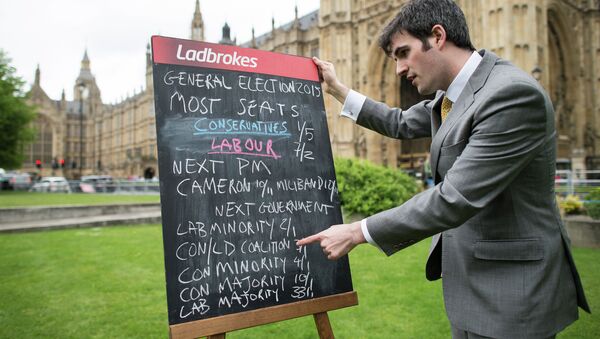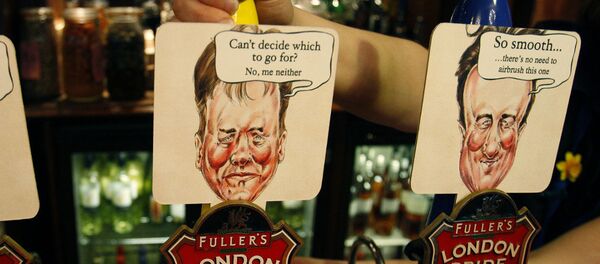MOSCOW (Sputnik) — While both Labour and the Conservatives, the country's two largest parties, argue that they could win a majority of seats in parliament, neither stands out as the obvious winner in the final opinion polls.
In order to create a somewhat stable one-party government, one of the two would need to land at least 326 seats in the House of Commons, the lower house of parliament.
The latest polls predict a best case scenario of just over 280 seats for the centre-right Conservatives and some 270 for centre-left Labour.
In 2010, the Conservatives received the largest number of votes among all UK parties, winning 306 parliament seats.
Teaming up with Britain's third-largest party, the centrist Liberal Democrats, they shortly formed a majority coalition government, ending over a decade of Labour rule.
After the 2015 election, incumbent Prime Minister David Cameron will likely get the first chance to form a cabinet, as outlined by local laws in case of a hung parliament.
The Liberal Democrats have previously stated that they would talk to whichever party gains most votes.
While seemingly open for cooperation with both the Conservatives and Labour, Lib Dem may not be able to help either achieve the needed parliamentary support, being forecast to lose as much as half of its 56 seats.
OUTCASTS GAINING SUPPORT
The Scottish independence movement, fuelled by the 2014 referendum, as well as rising anti-EU and anti-immigration sentiment throughout the United Kingdom, has significantly altered the country's political landscape.
The UK Independence Party, better known as UKIP, has seen a major increase in popularity over the last year.
Best known for its Eurosceptic, anti-immigrant stance, the party has perhaps attracted voters disappointed with the Conservatives' failed pledge to cut net immigration.
Labour and the Liberal Democrats have ruled out coalitions with UKIP, while the Conservatives have not yet addressed this scenario.
Despite the majority of Scots voting against secession from the UK in a referendum, 2014 was a triumphant year for the separatist Scottish National Party (SNP) as well.
Now the third largest party in the United Kingdom by membership, SNP might just be the one having the final say after the election.
SNP has earlier rejected rumours of a possible coalition with somewhat politically close Labour over disagreements on the deployment of nuclear weapons off the Scottish coast. It has also been firm in its opposition to the Conservatives.
Labour has also rejected the idea of a coalition with SNP, as have the Conservatives and the Liberal Democrats.
Nevertheless, local media have suggested that the SNP and Labour could reach a less formal deal known as confidence and supply.
Such an agreement could enable Labour to create a minority government, depending on SNP and possibly other smaller parties to back it in the parliament in return for enacting some of their policies.
The Conservative Party may also attempt to create a minority government, eyeing confidence and supply rather than a coalition, according to recent media reports.




